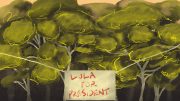A Conservative campaign pledge that would have attached federal grants to Canadian universities to a commitment to free speech is little more than an ideological “dog whistle” and “a solution in search of a problem,” according to faculty critics.
In his campaign for leader of the federal Conservative party, Andrew Scheer committed to withdrawing federal grants to universities that have not expressed an explicit commitment to protecting free speech on campus.
Scheer reiterated his position at a press conference two weeks ago when he said a Tory government would establish a regime that prioritizes federal funding for universities that “have taken concrete measures to protect free speech on campus.”
David Robinson, executive director of the Canadian Association of University Teachers (CAUT), called the proposal “red meat” for the conservative base and criticized it as electioneering.
“There is no real evidence that there is any kind of clampdown on free speech on campus,” he said.
University of Manitoba Faculty Association president Janet Morrill agreed the proposal politicizes the issue and argued it conflates disagreement with discrimination.
“I think they like to create a perception that they are being persecuted for those ideas,” she said, “when, in reality, I think that any debates can and should be held on university campuses and if people are disagreeing with them, it’s not a question of persecution — it’s a matter of legitimately disagreeing with those viewpoints.”
Robinson also questioned the messaging of flyers that were distributed by the Conservative party around the York University campus in Toronto in September that read, “Because you can only hear the same left-wing talking points from your professors so many times.”
“Having political parties talk about regulating speech on campus is very disturbing,” he said. “It threatens the principle of institutional economy. It threatens the principles of academic freedom and free speech on campus.”
The federal government transferred nearly $4 billion to post-secondary institutions in 2017-18, mostly through research granting programs. Provincial funding, which makes up the majority, is primarily directed to operating and capital budgets.
Legislation came into effect in Ontario in January mandating all publicly funded colleges and universities implement a free speech policy that “meets a minimum standard prescribed by the government.” Alberta post-secondary institutions have until December to establish policies conforming to the so-called Chicago principles.
The Chicago principles, adopted in 2015 at the University of Chicago, hold that debate may not be suppressed even if most of the university community finds the ideas “offensive, unwise, immoral or wrongheaded. It is for individual members of the university community, not for the university as an institution, to make those judgements for themselves.” The policy instead calls for open and vigorous debate of ideas.
While some Ontario universities had established free speech policies before the legislation took hold, Robinson said the Alberta policy is more troubling, noting that American principles of free speech and Canadian principles of freedom of expression — which place more strict limits on hate speech — do not evenly align.
Robinson also accused the Conservatives of inconsistent appeals to free speech, noting that while they defend the likes of notorious University of Toronto professor Jordan Peterson and Wilfrid Laurier teaching assistant Lindsay Shepherd, they also seek to limit debate surrounding the Israel-Palestine conflict.
“Their focus is on those rare instances in where there is a controversy over a conservative speaker,” he said, “but they don’t want to deal with any of the more complicated and nuanced controversies that come from the left.”
In September 2017, CAUT criticized Ryerson University after a scheduled panel discussion titled “The Stifling of Free Speech on University Campuses,” featuring Peterson and far-right commentator Faith Goldy, was abruptly cancelled. Robinson said CAUT also defended the University of British Columbia for not relenting to public pressure to cancel a speaking event by anti-sexual orientation and gender identity speaker Jenn Smith this summer.
He said that while a university does not need to open its space to every speaker, they cannot bow to public pressure once an engagement has been scheduled.
While the U of M does not have an explicit free speech policy, the office of human rights and conflict management’s respectful work and learning environment policy designates a work and learning environment that is free from discrimination, harassment and sexual assault.
Morrill argued that university campuses do not need legislation to foster debate, saying it “can, should and does [already] happen.”
“It is unfortunate when you can have people who are saying things that people find to be so objectionable and it’s hard to tolerate those things on campus, but you have to let that debate take place,” she said.
“And, in some ways, having those uncomfortable conversations that some people find objectionable maybe is the best way to have those viewpoints change.”





